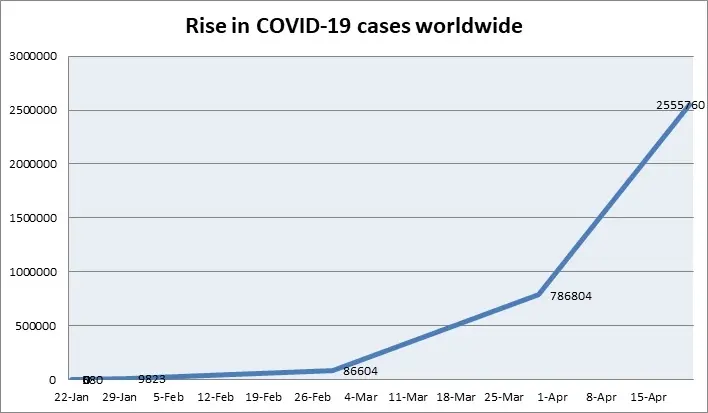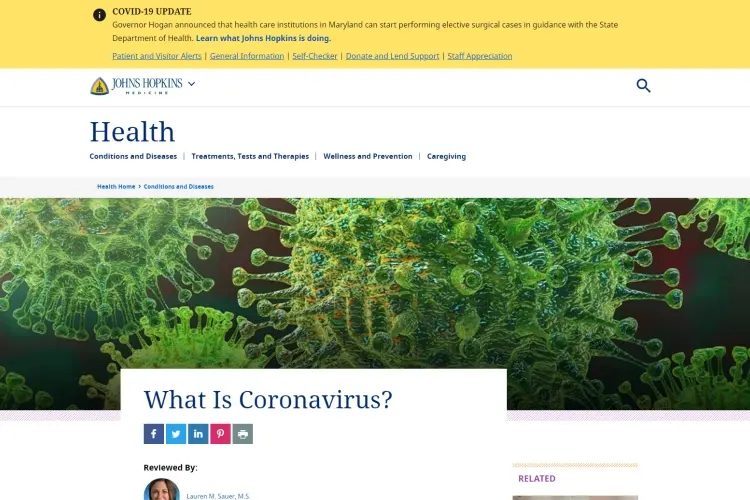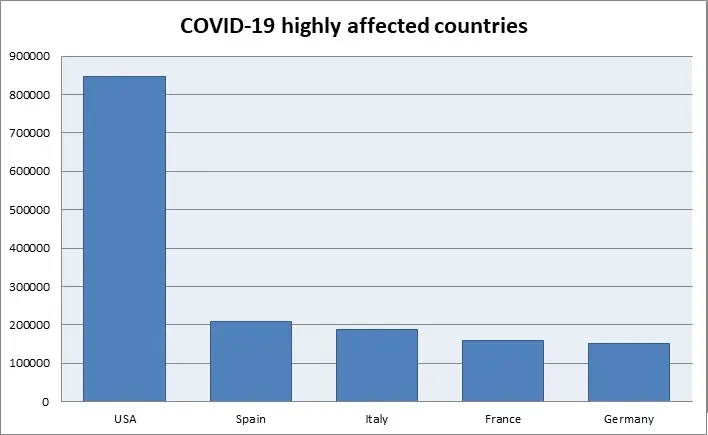by Rachel Garza
With millions of fatal cases worldwide, the coronavirus is one of the deadliest diseases of the decade. Originating from Italy and China, the virus spread to other parts of the world like wildfire and infected over 210 countries globally. The destruction by the virus is extensive as it continues to grow and spread every day, increasing the chances of higher mortalities.

Many countries have implemented lockdown in their regions to restrict people to their homes for their safety. Along with being quarantined at houses, we must take extra care to beat this pandemic. To keep ourselves safe from this deadly virus, we must know about the Novel Corona Virus (COVID-19) in detail by the health experts. Let's seek answers to all the questions in your mind regarding COVID-19.
Contents

Coronaviruses are an extended family composed of different viruses that have been known to cause various diseases in the past too. Viruses of the same family also caused Severe Acute Respiratory Syndrome (SARS) in 2002 and Middle East Respiratory Syndrome (MERS) in 2013. Many people initially thought that it is the same strain that caused SARS. But the World Health Organization denied and informed that this strain is a different one.
As told by the World Health Organization, the pandemic breakout globally is not a result of any of the previous strains of coronavirus. So far, seven types of coronavirus yare known to scientists, out of which four are rarely harmful. However, three dangerous strains cause deadly diseases, including SARS, MERS, and COVID-19 caused by the Sars-CoV2 strain of the virus family. The novel coronavirus or COVID-19 is suspected of spreading from the Wuhan province of China.
The scientists have not yet confirmed the exact source. But it is expected that the SARS-Cov2 was transmitted to humans through some animal just like SARS-Cov. SARS-CoV in 2003 was transmitted through Civet Cats. Whereas the exact source of SARS-CoV2 has not been declared by the researchers yet. It could be any domestic animal or a wild animal or might have spread by consumption of any animal species. The exact origin of the virus is still unknown.
Though COVID-19 is not airborne (inhalation of the virus through the air), yet it can be transmitted from one human being to the other. The infection usually spreads when one infected person sneezes or coughs in front of a healthy being. The virus can get into the respiratory tract through the nose and affect the healthy human. Other than this, it is also possible to get in contact with the virus through any surface. Yes, if an infected person sneezes or coughs and the virus is present on the surface, it can be transferred to your hands and enter your body if hands are not washed properly.
COVID-19 is not attributed to any specific age group. Humans of all ages, whether infants, young adults, or older people can get the virus if they come in contact with the respiratory droplets of an infected individual. However, reports suggest that people with compromised immune systems are more susceptible to the novel coronavirus. The group of most vulnerable individuals includes children aged less than five years, adults over 60 years old, and people with respiratory disorders like asthma. By no means, it indicates that young individuals cannot get infected. This makes it essential for everyone to take proper precautionary measures.
The most susceptible group of individuals is younger and older people as they have lesser immunity. However, people with other diseases like high blood pressure, diabetes, heart diseases, or cancer must also take extra care to keep themselves safe from the virus.
Other than the immune-compromised patients, doctors are also at a higher risk if proper precautions are not taken. The high risk is due to their direct interaction with the patients.
It is said that 80% of the patients develop acute symptoms and do not need medical help. With proper isolation and effective management of the symptoms, COVID-19 can be controlled. But, some patients need adequate treatment for the signs. And if not given proper care and treatment, a ventilator becomes the only hope of survival. If the patient feels any discomfort, he must report to emergency care immediately.
What are the symptoms of coronavirus?
Catching the virus is possible if you are going out or coming in contact with people who might be infected. The first presenting symptoms of COVID-19 are elevated temperature and cough. The virus also spread to others as people did not isolate themselves in these symptoms as they considered it to be a normal fever.
Other than these, some patients of the disease have also seen to have different symptoms and physical issues like:
Few cases have also reported experiencing a loss of taste or smell, and people are vastly using this parameter for self-assessment. Additionally, some patients developed pinkeye, and few others faced liver damage in severe COVID-19 cases.
These symptoms do not seem significant. Yet reports show that one out of every six patients needs medical assistance to fight off signs of the disease.
If you think that everyone with the disease would show symptoms instantly, it is not so. The incubation period of the virus in the body before showing symptoms is up to 14 days for COVID-19. It means that a person infected with the virus might not even catch a fever or cough from five to 14 days of contracting the virus. It is important to isolate yourself in an indication of the common symptoms too.
Coronavirus does not have a treatment itself as the virus completes its lifecycle in the human's body before dying. The only way to treat or manage COVID-19 is to manage the symptoms like fever and cough to provide relief to the patient.
No, antibiotics are only effective against bacteria. As a virus is responsible for COVID-19, taking the antibiotics would not improve the patient's condition. Importantly, antibiotics should only be used by a physician's prescription.
Is there a vaccine for COVID-19?
As the virus is not previously known and it is a novel virus, no vaccine is available for it. Many kinds of research around the globe are being carried out to develop a vaccine for this disease. Yet, it is not possible to provide a vaccine in days for public use. Introducing a vaccine for the novel coronavirus can take many years.
The best way to save yourself from the virus is to stay at home and practice social distancing. If you have to go out in case of any emergency, a few things must be kept in mind for protection against the disease.
According to recent findings by March 3, the mortality rate of COVID-19 is 3.4%, with the most death is people above 80 years of age. The Case Fatality Rate (CFR) of males is also found out to be more than females, i.e., 4.7% and 2.8%, respectively. Moreover, patients with comorbid conditions like cardiac diseases, high blood pressure, diabetes, and cancer also show a higher mortality rate.
The novel coronavirus has proved to be one of the scariest and deadliest diseases of the decade. There has been an enormous loss of life worldwide at an incredible rate.
1. United States of America
2. Spain
3. Italy
4. France
5. Germany

The virus originated from the province of Wuhan in China. China declared itself Corona-free a few days back. But, a few more cases have been reported which are not locally transmitted. China took over the situation as soon as it got an understanding of the virus. The people stayed at home for as long as they could, until they defeated the virus. These few risen cases are nothing as compared to the daily increasing cases of COVID-19 globally.
We can beat this virus by practicing social distancing and following the preventive guidelines provided by the World Health Organization.

About Rachel Garza
Rachel Garza is a passionate writer with a deep fascination for technology and science. Born and raised in an intellectually stimulating environment, she developed an early interest in exploring the latest advancements and breakthroughs in these fields. Rachel's love for writing and her insatiable curiosity led her to pursue a career as a tech and science writer.
 |
 |
 |
 |
Check These Out